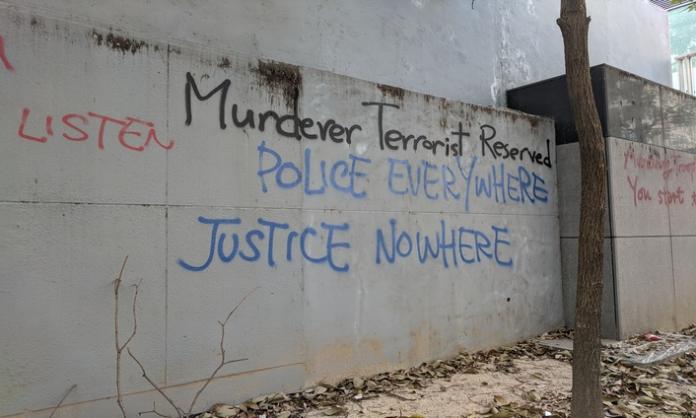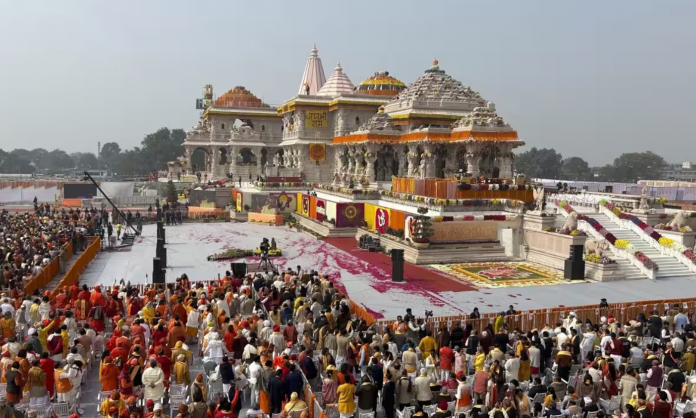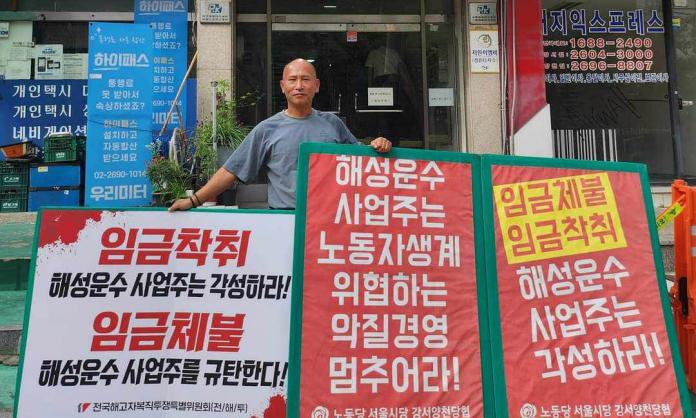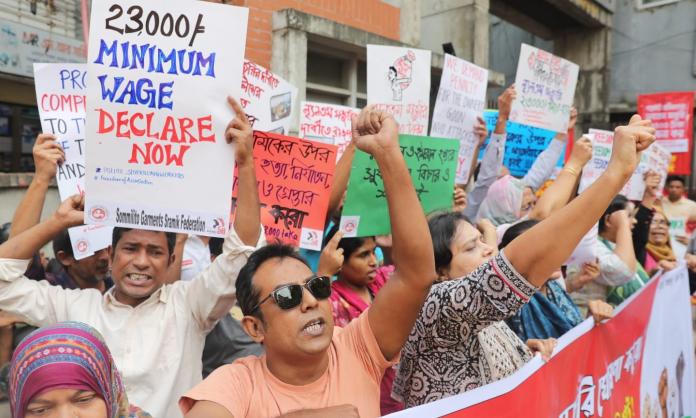It’s Wednesday lunchtime at the intersection of Des Voeux Road and Pedder Street. Several hundred protesters are chanting and jeering at police. They raise a hand with all fingers spread, each a signifier of one of the five demands of the movement. One chant berates the cops as triads (mafia). Then there is the call of “Rapists! Murderers!” Another is for the immediate disbanding of the force. Perhaps the most ultra-militant chant is the one wishing death on officers’ family members. One wearing a red helmet raises a small canvas banner, which reads: “Police Warning: This meeting is in breach of the law. Disperse or we may use force.” In response, a cacophony of boos and cheers.
Two things stand out here. First, when the riot police move in (they were waiting in eight vans for the assembly to begin), the protesters immediately clear the road and shift to the pavement, where they are legally allowed to congregate; there is no street fighting like at Mong Kok and other places over the past week. Second, the assembled are impeccably dressed and without weapons – this is Central district, Hong Kong’s banking centre and one of global capitalism’s most important financial hubs. Picture employees from Sydney’s Martin Place, New York’s Wall Street or the City of London screaming “I hope your mother dies!” at on-duty police and you will have an accurate representation of what is going on here.
“I feel like it’s like a civil war situation”, Howard says, as he alternates between joining the chants and translating them from Cantonese into English. Wearing a grey tailored suit with brown pointed leather shoes, he works for one of the big firms here and has been coming to these demonstrations, which occur every lunchtime, for the last week and a half. “The disruption is for economic effect. This is one of the few things we can legally do”, he says. “We might be a bit depressed after what happened at PolyU [the siege of the student-occupied Polytechnic University, which has resulted in more than 1,000 arrests] – but we have so much support. There are seven million of us, so this will not stop us. If you support the police, I think you are brainwashed.”
The demonstration today is down in numbers from the heights of last week, when they had enough people to block the roads, but the militancy remains. As two of the unneeded police vans drive off, all corners of the intersection erupt in jeering. “We’re not blocking the road! You are! We’re legal – you’re illegal!” How is it that even the financial district has become a hotbed of anti-cop rage? “It has been building for some time, five months (the protest movement began in June). But I think Monday was a turning point”, Howard says. Monday last week, an officer shot a young protester in the abdomen at point blank range. Video footage of the incident went viral. Three people now have reportedly been shot by live rounds, a young woman says that she was gang raped by cops in a station, and everyone says that these publicly-known incidents are only the tip of the iceberg. Because the police investigate themselves and no-one is being disciplined, other victims will not come forward. “That’s why we chant ‘Triads!’ They are gangsters who can do what they want with no control.”
Howard isn’t the first person here to have used the term “civil war”. At the Polytechnic last week, Tin said the same thing. He wasn’t referring to the students’ actions. The police, he said, are taking people out behind the scenes. How true this is I don’t know. But it is a widely-held belief. “The students say it is true”, Howard says. “I believe them. The police are liars.” But it’s not just the students who believe it. And it’s not just their supporters who say it. Financial Times journalists Sue-Lin Wong and Nicolle Liu yesterday quoted a young officer admitting, “No one follows the rules and guidelines anymore. When my colleagues break the law, they never admit it and our supervisors provide cover for them”. Today, the BBC has run a story quoting Simon Cheng, a former trade and investment officer at the UK consulate, saying he was taken by mainland police and tortured for two weeks in August:
“I saw a bunch of Hong Kong people getting arrested and interrogated. I heard someone speak in Cantonese saying: ‘Raise your hands up – you raised the flags in the protest didn’t you?’ ... The secret police clearly stated that batches after batches of Hong Kong protesters had been caught, delivered and detained in mainland China.”
These sorts of stories, and the police handling of the situation, have turned a society of decorum into a rage. “The relations between people and the police used to be quite good”, an older labour movement activist says. “Before June, there was a sense that there was accountability.” A Chinese University of Hong Kong survey last month found that about 50 percent of the population doesn’t trust the police at all. Before the protest movement, the figure was 6.5 percent. It would be interesting to see what the proportions are now. Footage of officers kicking the heads of already subdued protesters lying on the ground have gone viral since the Polytechnic siege. So too footage of young high school students being arrested in their uniforms on the way to school.
Police claim that they have been restrained. But it is astounding, given the situation, that more people have not been killed during the recent clashes, in which officers have fired countless rounds of potentially-lethal rubber bullets. The have also concentrated on chemical warfare: gassing the hell out of the place to suffocate everyone into submission. At Mong Kok last Tuesday and at the Polytechnic on Sunday, even some front liners with high-end gas masks sometimes succumbed. People were being dragged away by medics in what looked like semi-paralysis. Some were throwing up as first aiders drenched them in water to wash the residue from their skin.
The blanketing of protest sites with tear gas has been so intense that the Cleaning Workers Union today held a press conference/protest calling on the government to stop the police deploying it. The cleaners are overcome by the residue, which is stirred up when they sweep the streets. One worker says that she is constantly coughing at work now. It’s not safe and the government doesn’t care, she says. “They think our lives are cheap.” Danny To, an organiser with the union, says after the conference:
“They [the workers] don’t have enough protection. We want the government to supply proper masks and goggles and rubber gloves. In the areas heavily affected with tear gas, they should have professional teams with full equipment. The government said they don’t know very well the chemical substance of the tear gas. It is ridiculous – they are using it everywhere. If they don’t know, they don’t know the threat to public health. They should stop using it.”
A friend here who can read Chinese says that debates are raging in activist forums. Some front liners (the activists who dedicate themselves to fighting the police at demonstrations) are upset that many people at the protests don’t wear gas masks. This means that, when the police volleys come, everyone runs, leaving the advanced guard exposed. Others say that the front liners’ Molotovs aren’t effective – or they just don’t have the skill to throw them far enough. One lesson reportedly being drawn (how widely I cannot say) from the Polytechnic siege is that activists cannot hope to counter the full force of the police. Some are saying that too many have been arrested for little gain. They must return to where they were two weeks ago: with Bruce Lee’s “be like water” approach of smaller actions from which they rapidly scatter before the police have a chance to respond.
Only the activists will know what is really going on and what is to come. It’s unclear how many of the Polytechnic arrestees were central to the movement and whether or not they have been charged and held or released. And a lot of people seem to have gone to ground as the police rounded up so many of their comrades. If things return to the frenzy of last week, however, it might get messy. Some of the cops – already partially off the leash, according to that Financial Times article – seem to be baying for blood. As journalists escaped the siege of PolyU while the sun was coming up on Monday morning, a pack of riot police was going feral. The officers weren’t performing; it was pure rage if ever I’ve seen it, even if their yells were muffled by full face gas masks. By many anecdotal accounts, it is the fury of a rank and file desperate to drown the rebellion in blood, if only their superiors would give the green light.
“Honestly, police have been very lenient”, former police superintendent Clement Lai Ka-chi told the South China Morning Post yesterday. “They have a lot of options, in terms of tactics and weapons – way more than you can imagine. But they have only used the tip of the iceberg of what is available to them.” This seemed an ominous warning from someone still plugged into the officers’ circles: you ain’t seen nothing yet. This week, police have started carrying AR-15s and other semi-automatic weapons. The police high commanders are making clear gestures about what they may be prepared to do to bring the situation under control. Are they bluffing? Who knows? But a heavy responsibility must now weigh on the activists. Will they respond to the fall of the Polytechnic and the mass arrests? If so, how will they stay safe?










